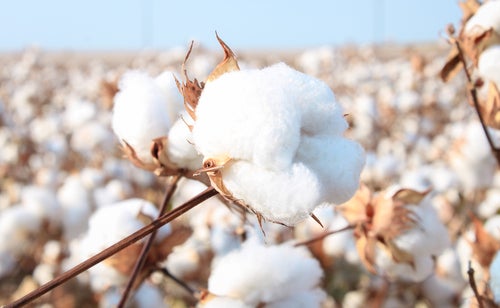
The US Cotton Trust Protocol has released its first annual report titled ‘Setting a New Standard in Sustainability,’ which reveals how it is bringing quantifiable and verifiable goals and measurement to responsibly-grown cotton production.
The organisation wants to set a new standard for more sustainably grown cotton by supporting those across the apparel supply chain.
The US Cotton Trust Protocol, which is voluntary for US cotton producers, reports on six key sustainability metrics from the farm-level to deliver against science-based targets and improve performance.
The six key metrics to validate sustainability performance are:
- Land use
- Soil conservation
- Energy use
- Greenhouse gas emissions
- Soil carbon
- Irrigated water use.
Dr Gary Adams, US Cotton Trust Protocol president said in the introduction to the report: “The US Cotton Trust Protocol (Trust Protocol) has made significant strides in its first year. We have established a new system for sustainably grown cotton from scratch. One that now counts 560 organisations across the supply chain as members.”
It already has over 300 grower members, 27 brand and retailer members and 525 mill and manufacturer members, including subsidiaries.

US Tariffs are shifting - will you react or anticipate?
Don’t let policy changes catch you off guard. Stay proactive with real-time data and expert analysis.
By GlobalDataThe brands already on board include:
- Levi’s
- Next
- Gap
- Tesco
- Tommy Hilfiger
- Dockers
- Old Navy
- Gildan
- Calvin Klein
- Banana Republic
- Target
- Athleta
- Advance Denim
- Byford
Future targets for the US Cotton Trust Protocol
The report explains the Trust Protocol will continue pushing forward with its ambitious agenda. It aims to support growers, brands and retailers on their pathway to becoming more sustainable. It aims to enrol 50% of the cotton grown in the US by 2025 from the cotton seed through to the store and provide full article-level supply chain transparency for its members, which it says is a world-first in sustainable cotton fibre.
By 2025, the organisation also wants to reduce water use by 18%, greenhouse gas emissions by 39%, soil loss by 50%, and increase land use efficiency by 13% and soil carbon by 30%, while decreasing energy use by 15%.
The US Cotton Trust Protocol plans to make these aims a reality by working with its members using the theory of change, which is grounded on science-based measurement and feedback.
The report explains the theory of change outlines the organisation’s mission to bring quantifiable and verifiable goals and measurement to its six key sustainability metrics of US cotton production.
The Theory of Change Mission: To bring quantifiable and verifiable goals and measurement to the key sustainability metrics of US cotton production.
The Theory of Change Vision: To set a new standard in sustainable cotton production where full transparency is a reality and continuous improvement to reduce our environmental footprint is the central goal.
The Theory of Change Core Values: A commitment to US cotton’s legacy of authenticity, innovation and excellence, environmental stewardship, caring of people, and personal and corporate integrity.
Adams believes the organisation’s success to date and moving forward is based on the expertise and input of leading experts from across the world in data collection, verification and tracking to provide a robust third-party verification system.
He said: “Today, the Trust Protocol offers unrivalled transparency and visibility of cotton through the supply chain, backed by an unparalleled level of independently verified data from our grower members. We are bringing quantifiable and verifiable goals and measurement to the key sustainability metrics of US cotton production —
building trust from field to fabric and enabling continuous improvement across the supply chain.”
Adams pointed out the Trust Protocol is designed to deliver a better future for US cotton, ensuring that it contributes to the protection and preservation of the planet, using the most sustainable and responsible techniques.
He believes that it is essential to work with cotton members as well as brands and retailers along the cotton supply supply chain.
He said: “We will also continue in our effort to enrol 100 global brands and retailers and 1,000 mills and manufacturers. We will continuously review
and update targets each year.”
Click here to read the report in full.



